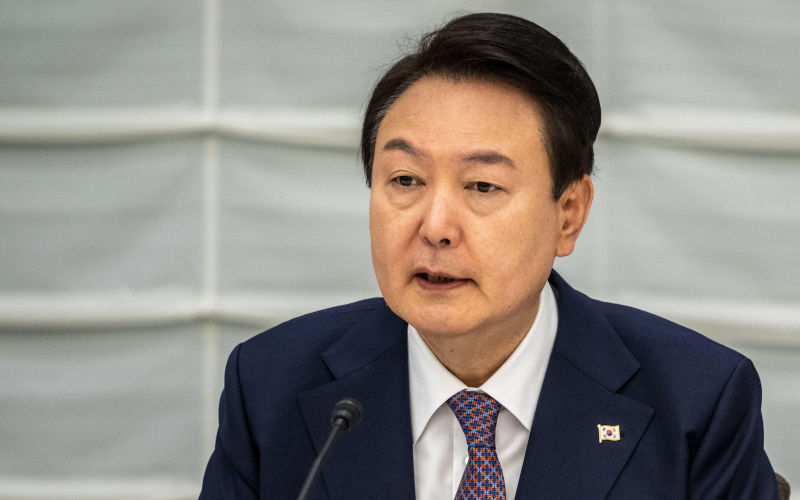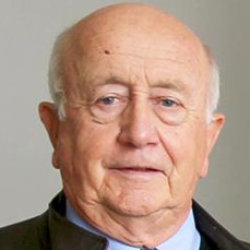Republic of Korea – Tricky transition times ahead
April 12, 2025
The unanimous decision of the ROK’s Constitutional Court ( 8-0 including those judges nominated by his party) to uphold the National Assembly’s decision to immediately impeach former president Yoon Suk Yeol marks a very significant milestone in the country’s short democratic history.
But it leaves much to be played out in a complex and volatile domestic political scene with wider regional and global implications.
There has long been some concern in ROK legal and academic areas about what is termed “executive overreach” by sitting presidents – as well set out by an article in Foreign Affairs earlier this year ( _The Roots of South Korea’s Political Crisis, February 2025_). All of which provides the backdrop to Yoon’s extraordinary attempt to impose martial law. This all came to a critical head when the Opposition Party (Democratic Korea) won a landslide victory in the 2020 National Assembly elections and started to dig its heels in by demanding more say in the development of policies and the requisite budgets. Inevitably this led to polarisation of the domestic political sphere which eventually resulted in a frustrated Yoon making a cardinal error of judgment in declaring martial law amid wild claims that the DP was bent on bringing the ROK under communist rule, and even that some of its leaders were in cahoots with North Korea.
Against this background, it is important to note the Constitutional Court’s ruling which was lost in the announcement of the verdict which was directly addressed to both major parties to calm the way politics are run in the ROK.
“By declaring martial law in violation of the Constitution and relevant laws, the respondent re-enacted the historical abuse of emergency powers, throwing citizens into a state of shock and causing disruption across all areas of society, economy, politics, and diplomacy.”
- While acknowledging intense political tensions and the Opposition’s impeachment motions, the Court stressed that Yoon had the democratic tools to resolve political disputes without unconstitutional actions. Nor did his actions meet procedural requirements, as he did not sufficiently consult the cabinet, or notify parliament about his martial law proclamation.
- The court found he had deployed military and police forces illegally to obstruct the National Assembly, infringing on lawmakers’ constitutional rights and undermining democratic governance.
- it agreed that the proclamation banned political activities, infringing citizens’ basic rights.
- It concluded that Yoon had ordered unwarranted searches of the National Election Commission, breaching its independence.
- It also noted that Yoon had infringed upon judicial independence by attempting to locate former senior judges for potential arrest.
Where to now?
As of late 5 April, there are still large demonstrations being planned by both sides and (understandably) confusion reigns. Yoon has issued a brief statement apologising for the turmoil he created, but not definitively closing off a political future. The acting president and the two party leaders have taken calming lines seeking to avoid any violence by the huge groups of supporters in the streets and build towards more co-operation between the two major parties in seeking to reduce polarisation. (As a side note, it has been gratifying that so far the massive deployment of police in the streets has contained the all-too-familiar violence of Korean street protests).
Political eyes are now on Yoon’s criminal insurrection trial and the elections mandated to occur within 60 days. Central to both will be how committed the leadership of the major parties will be to lowering the temperature in the political debate. Given its political history, starting with military rule, this may well prove to be a tall order, but it does offer some opportunities for a transition to a more workable governance for the ROK – especially in such a threatening global environment.
As ROK law prevents a president in office being charged for insurrection — a criminal case — Yoon’s impeachment has opened the way for his criminal trial (and that of his associates) which will start on 14 April. This is likely to reveal more details of Yoon’s involvement – as well as that of his former defence minister and senior military commanders acting under his instructions. It carries a sentence of death or life imprisonment – though the maximum sentence is widely dismissed as unlikely. It will also be spiced up with allegations of corruption levelled at Yoon’s wife. But its deliberations could well provide plenty of fodder for both sides on the streets if political leaders choose to stir things up as the trial is expected to last until the early weeks of the next presidential election campaign.
Not surprisingly, given the agonising history of the ROK’s military regime, Yoon’s abortive martial law attempt triggered an immediately massive “people power” reaction with matching anti-Yoon opinion polling. Though the polling numbers have softened since then, they still point to the Opposition regaining the presidency and government. Its leader (Lee Jae-myung) lost to Yoon by a narrow margin last time, but led his party to an outstanding success in the National Assembly elections. He has skilfully managed his party’s involvement in the impeachment process. His political career is not entirely unblemished and he survived a knife attack in 2024, recovering after surgery.
Whereas, the Government People Power Party (PPP) is in disarray following Yoon’s impeachment – with no clearly established contender to put forward for the presidency and precious little time to find one. Former moderate conservative Han Dong-hoon was a particularly vocal opponent of Yoon’s martial law declaration and resigned the PPP leadership over it. For the rest, it seems a pretty open field as Yoon may try to involve himself in the selection process.
All of which poses some daunting issues for the current acting president (Han Duck-soo – previously prime minister under Yoon) as he seeks to manage the workings of the ROK government through these extremely volatile weeks leading to the election. This will be no simple limbo period on either the domestic, regional or international fronts. Difficult decisions will have to be taken – and the Opposition (and likely soon new government) will have strong counter views which will polarise the election campaign. The instincts of Han — whom I knew and respected as a trade minister during my years in Seoul more than 25 years ago — are likely to be to navigate as smooth a path as possible.
Nowhere are Han’s challenges more daunting than in regard to the ROK’s bilateral relations with the US. Since the armistice of the Korean War and the continuing threat from the DPRK, the ROK’s dependence on a US defence umbrella has been fundamental but not without periodic issues. It was particularly noteworthy that in his “legacy “statement, former president Joe Biden singled out the significant strengthening of the bilateral relationship with the ROK under Yoon – though the dominant Opposition had a far less sanguine view of this relationship. Biden and his team claimed to have had no prior knowledge of Yoon’s planned declaration and there was a significant delay in an official US reaction which came from a senior State Department official calling in the ROK ambassador and subsequently telling the media that, while the bilateral relationship was “ironclad” (a word repeated by US officials), Yoon’s action was wrong. Almost immediately after this, Yoon’s propaganda machine followed suit with the ironclad line and the Stars and Stripes started appearing in large numbers amid the pro-Yoon street supporters. Significantly, the next day the Trump team made its impact with Trump signs and merchandise scattering among the pro-Yoon crowds.
With Trump now in the White House, the relationship has become much more complex. Many Koreans have bad memories of the public disdain of the ROK and Koreans by Trump – especially with respect to burden-sharing with the US forces stationed in ROK. Now Han has the explosive challenge of Trump’s tariff policy which (as feared) targeted the ROK. There are even more worrying threats of additional tariffs on computer chips and EVs. All these issues are bound to add fuel to street demonstrations and the elections.
Given all of this, it was particularly interesting timing for the trade ministers of China, ROK and Japan to revive their long-delayed trilateral meeting in the ROK last week while their foreign ministers met in Japan. Both were designed to discuss a possible trilateral free trade agreement and prepare a regional response to Trump’s tariff “war”, with all three being major targets. This would likely have Opposition support.


